|
|
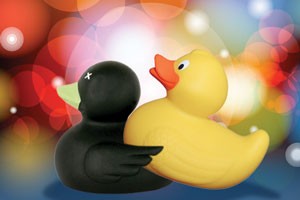
The BBC Proms got underway with, quite literally, a bang on Friday with the first night premiere of Gary Carpenter’s Dadaville, fireworks and all. I notice that the BBC appears to be separating out works on iPlayer this year, so if you want to listen only to a particular piece, you don’t have to search through the whole concert. For a complete list of Proms premieres, see my earlier blogpost, here.
The Tête à Tête Opera Festival at King’s Cross, London began yesterday, but there is still plenty of time – it runs until 9th August – to sample its many pleasures. The Festival now lays claim to be the largest of its type in the world and, given this, it is difficult to characterise in a few words. Fundamentally it is a crucible for new opera, from the serious to the silly; the prize for the latter this year going to The Homosexual Necrophiliac Duck Opera which has the the tagline ‘It’s Quakers!’ There’s also a contemporary clinic for new works with the brilliant Jane Manning on 8th August. As far as I can see, they are still accepting applications. If you can’t get to London, Tête à Tête also post videos of most of the operas on their website.
The Lucerne Summer Festival (14th August–13th September) this year takes laughter as its theme, examining it in all its forms: ‘as clever wit and elaborate punchlines in the music of Haydn, as bitterly angry satire in Shostakovich’s symphonies, as colourful collage in Prokofiev and Stravinsky, as laughter with tears in Mahler.’ I don’t think this necessarily has anything to do with the music of Jürg Wyttenbach and Tod Machover, the two festival composers-in-residence, however. The music of the former features in four concerts on 21st and 22nd, which include the world premiere of Der Unfall, a madrigal play for ten participants and Gargantua chez les Helvètes du Haut-Valais in a new arrangement for ensemble. Tod Machover, on the other hand, has been commissioned to write A Symphony for Lucerne, a work that will be built from sounds of the city found by the composer and its residents. It is premiered on September 5th. There will also be a series of 7 Boulez tribute concerts held on 23rd August, with his music appearing prominently elsewhere in the festival programme.
Nestled just inside the mid-Walian border, the Presteigne Festival (27th August–1st September) has a strong tradition of presenting new music, this year being no exception. There are world premieres from Michael Small, Joseph Phibbs, David Matthews, Cecilia McDowell and David Knotts. There is also an opera double bill (Welsh premieres) on 27th that examine recent historical characters: Charlotte Bray’s Entanglement is about Ruth Ellis, the last woman to be executed in the UK; Thomas Hyde’s That Man Stephen Ward charts the downfall of one of the central figures in the Profumo scandal. Outside the premieres there’s plenty of other new music to find, often imaginatively programmed around the festival’s Nordic theme.
0 comments
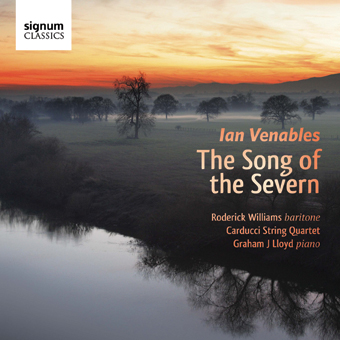
As so often is the case, my reaction to the incredible range of new music on release this month is to wonder why the classical music public remains so fixated on the past. It’s almost as if the whole melting pot of musical history, from Hildegard of Bingen to Boulez (let’s not forget that he’s not really ‘contemporary’ any more), exists in the here and now. The pullulating, bristling, teeming music scene, in which every conceivable style is being explored, venerated, parodied and reinterpreted, has something to offer everyone. It’s only quality that matters, since in taste there are no arguments.
If, for example, you’re not so keen on dissonant music, have a listen to Ian Venables’ new disk of works for baritone, headed by his song cycle The Song of the Severn. The harmonic style springs very much from the pastoral tradition of composers such as Finzi and Vaughan Williams, though with plenty of tonal twists that are completely his own. Like them he also possesses a remarkable knack for balancing the exigencies of words setting with lucid musical structures. Baritone Roderick WIlliams, having recorded plenty of this kind of repertoire before, is splendidly at home.
A work that also wears it antecedents like a rose is Will Todd’s Alice in Wonderland. From the cliched fourths with which it begins, it makes no pretence at originality. There’s a bit of everything: jazz, film music, broadway shows and the occasional bit of contemporary ‘bite’. But the writing is full of such wit and verve, the styles integrated with such tremendous skill, that the result is compellingly good fun. Opera Holland Park perform with gusto.
Arvo Pärt’s static style is, of course, very much his own, though those ethereal vocal textures inevitably conjure up the wonders of renaissance polyphony, despite the relative absence of counterpoint, not to mention his propensity to use crunchier harmonies. Col Legno have just released a programme of eight vocal works to celebrate the composer’s 80th birthday, which falls on 11th September. The boys of the Wiltener Sängerknaben and Wilten choir occasionally struggle with the extremes of register (especially in a more full-blooded work like The Deer’s Cry) but the purity of their singing elsewhere is ample compensation.
Another octogenarian is Terry Riley, whose birthday fell on June 24th. The Kronos Quartet have just released the album Sunrise of the Planetary Dream Collector together with a five-disc box set to mark both his birthday and their long-term collaboration with him. A bit like Arvo Pärt, Riley hardly needs introduction from me, being a towering figure in contemporary music. If, however, you associate him only with the arch-minimalist In C, this disc is worth hearing, since it shows him to be a composer of much greater flexibility than that mechanistic work implies.
Pärt and Riley represent the popular face of mainstream contemporary music. They are both enormously respected but have forged individual styles that have allowed them to connect with the wider public. If you are looking for something a little more adventurous try a new disc of Piano Trios (and other works) on Naxos by Spanish composer Benet Casablancas. The style is dissonant, angular and challenging. Also on Naxos are two albums of music by composers of Chinese origin: Bright Sheng’s Night at the Chinese Opera (not to be confused with Judith Weir’s opera of the same name), which forms the second work in a larger programme of chamber music; and a programme of music for winds by Yi Chen.
Pēteris Vasks’ style owes much to Lutosławski and other Polish music of the 1960s, but with influences that derive from his native music of Latvia. His new disk on Wergo contains Sala and Credo for orchestra and Musica Appasionata for string orchestra. Also on Wergo, finally, are four works by Swiss composer Michael Pelzel. The most important work of his to date, Sempiternal Lock-in, heads this programme of his ensemble works.
0 comments
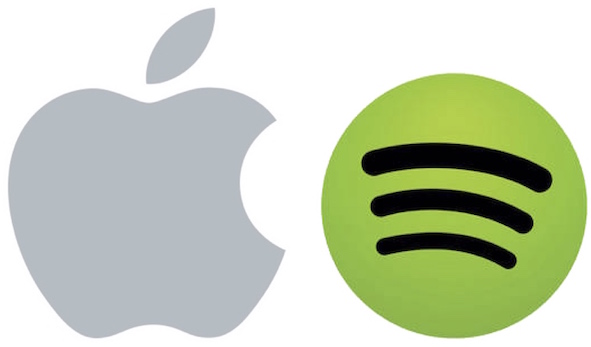
There have been many how-to’s and reviews written about Apple Music, very few of which have focused on classical, let alone contemporary classical, music. Perhaps the most thoughtful perspective was offered by Alex Ross in the New Yorker on Monday. Not so much a review, it instead pointed out some worrying issues, particularly that streaming is not well-suited to the production and consumption of classical music.
Despite the Ross’s reservations, one mustn’t forget the advantages that streaming offers. Most importantly, it removes some of the risk in experiencing new music, since doing so is free from additional payment. This has certainly been my experience with Spotify, which has allowed me to experience a great deal of music that I would never have risked buying. For me, therefore, the release of Apple Music was a moment of great excitement and, as a convinced subscriber to Spotify, my question, inevitably, was how did it stack up against its Swedish competitor?
Apple music costs £9.99 in the UK, which seems unfair given that it is $9.99 in the US (and €9.99 in Europe). As I write, the exchange rate is $9.99 to £6.49. Over the course of a year Apple Music will currently cost a UK customer £42 more than a US customer. Still, this is the same price strategy as Spotify, so you either swallow it or go elsewhere. Apple Music also offer a fairly generous £14.99 membership for families up to six (also $14.99 in the US, however). Spotify has promised to match this deal soon.
When you sign up to the service you have the option to tell Apple which genres interest you. Most of these refer to styles of popular music so I deleted everything but classical. Once you have done this you choose some ‘artists’. I use inverted commas because, actually, Apple includes composers in this list. The choices are pretty limited, but at least it gives the app a starting point in getting to know your tastes. The app itself consists of five parts: ‘For You’, ‘New’, ‘Radio’, ‘Connect’ and ‘My Music’.
‘Radio’ principally refers to Apple’s Beats One Station, which focuses on popular musical genres presented by live DJs. There are also a series of radio stations built from playlists focusing on various other genres. The lack of the human presenter does not necessarily mean, however, that the personal element is missing; Apple has gone to some effort to create playlists made by real people. I found the classical station rather pleasant, a nice stream of Classic FM-esque popular classics. It certainly has more variety than the lists presented by Spotify, which often plays the same works or a series of extracts from one piece (last time I listened I had parts of the Mozart Requiem four times in quick succession).
The ‘Connect’ page is where you are supposed to be able to follow news from your favourite artists, an idea that Apple has tried before with its ill-fated ‘Ping’. I like the idea of this part of the app but, sadly, its classical content has been sparse and unchanging. I have been presented with just two videos that have really interested me: Simon Rattle talking about music streaming (sounding for all the world as if Apple had paid him to do so) and Pierre-Laurent Aimard talking frustratingly briefly about performing the Ligeti Etudes. These videos don't ever seem to change and are accompanied by other items that interest me not one jot (but also never seem to change). If the experience is like this for other genres of music I predict that ‘Connect’ will be first part of the app that gets the chop.
The ‘For You’ section of the app offers personalised selections based upon the genres you chose on setup and, presumably, your listening habits. Mine are pretty catholic and, when I listen to popular music, probably lacking a bit of taste. To give you an idea, in the last few days I have listened to all of Boulez’s Le Marteau Sans Maître, a bit of Nico Muhly’s Two Boys and also more mainstream classical music such as Bach’s Christmas Oratorio and B Minor Mass and Handel’s Messiah. I also have a bit of a thing for Spanish language popular music having listened to Enrique Iglesias, Mocedades (that one is definitely shameful!) and Ricardo Arjona. ‘For You’ is currently showing me quite an array of interesting things: Simon Rattle Mahler 2 with the Berlin Phil and an Harnoncourt Messiah – wasn't aware that either of those existed; there’s some Boulez and Stockhausen including an ‘Intro to Pierre Boulez’ playlist; many other interesting classical records; some Mocedades (!); and various Spanish singers, none of whom I know, which is a good thing. There is also some rubbish: a ‘Classical Music for Ironing’ playlist, Britney Spears and Rihanna. But, hey, none of it is more cheesy than Mocedades, so maybe I should open my mind. ‘For You’, then, is a success and I will have fun digging around in it. It also makes up a little for the ‘New’ section of the app. This concentrates on new releases in popular genres, which is completely fine if that is what you’re looking for. It’s just a shame that it doesn’t seem to have heard of classical music.
These suggestions, after barely more than a week using the Apple Music app, stack up pretty well against Spotify. I use Spotify almost exclusively for streaming contemporary music, especially for doing reviews on CT, so you’d think that it would be able to recommend me at least a few contemporary composers. The ‘Discover’ section is currently showing me eight ‘top recommendations’, all classical but none later than Liszt (a composer I am not anyway that keen on). It makes a reasonable stab at showing me new releases, better in fact than the ‘New’ section of the Apple app, though actually it is just four records of easy listening classical and film music. Given that I’m only too well aware that there is much more interesting music being released on Spotify each month, a good proportion of which I have actually played, this is, in fact, a terrible fail. It has more success with recommendations based on recent listening. I’d forgotten I’d listened, for example, to Carnival of the Animals and, for nostalgic reasons, Flanders and Swann. Spotify makes sensible suggestions based upon these: Ravel, Mascagni, Elgar, Victor Borge and Spike Milligan. Not bad, though in terms of both breadth and presentation I prefer Apple Music.
The last part of Apple Music is the ‘My Music’ tab. This is where your original iTunes library resides which, in my case, includes all of the music from iTunes Match. When you search for music you have the option to search within that library or within the whole of the iTunes catalogue. What makes a massive difference to me, especially when compared to Spotify, is that when you search Apple Music you can then add the album to you own music collection, which means all of your streamed and non-streamed music resides in one place. For the completist collector who already uses iTunes this is a huge advantage.
Apple Music also deals with composers better than Spotify. When I want to collect albums together in one place by composer, on the latter I have to assign them a playlist. Apple Music, by contrast allows you to show your library by composer. Furthermore, with my own collection I have spent many a long hour making sure that the composers’ names are consistent on every album. I always have the surname first, like this: ‘Mahler, Gustav’. This allows for easy alphabetical access. When you add a new album this data is often entered in a different form, for example ‘G. Mahler’, which irritatingly creates a new composer. What is wonderful is that if you add a streamed album from Apple Music, it still allows you to edit the album information, so that you can make this kind of thing consistent. This ability to organise is far in advance of that offered by Spotify.
The final question when comparing the two services is, inevitably, the depth of the library. Both are touted as offering 30+ million tracks. A cursory search for popular classical works on either offers a massive choice of Beethoven Fifths, Handel Messiahs and Vivaldi Four Seasons. I was most interested, however, in the choice of contemporary classical works so tried a little test. I took the last two CD roundups I have written on CT and checked how many of the works I mentioned were available on each service. I was a little surprised by the results: of the 27 titles Apple had 24, Spotify just 13. There are caveats: the sample is quite small and I also have a tendency to check similar record labels each month – in fact the difference between the two services was very much down to the fact that Naxos releases are not always available on Spotify. Having said that, the test really should have favoured Spotify, since I tend to prefer writing about works that appear on the service. And, anyway, not consistently streaming Naxos releases is a glaring omission – they have one of the best collections of contemporary classical works.
Conclusion
Some have called the Apple Music app overblown. Personally I prefer plenty of options, especially when it comes to curating my music collection. If, however, you like a lightweight app or only use streaming occasionally then Spotify is still a good option. Certainly, for a quick search on Mac or PC, it is much more efficient since it is free of all of the iTunes baggage. And we shouldn’t forget that, of the two services, Spotify is the only one to have a free advert-supported option while it is also available on both iOS and Android (though Apple have promised that the latter will be released soon). Despite all of this, it is impossible to ignore Apple’s better discovery options, the more comprehensive music catalogue and the ability to arrange by composer and to integrate with an existing iTunes collection. The experience is significantly more compelling.
I will not be leaving Spotify for now. I feel a great deal of loyalty to a company that has so transformed the way that I listen. My patience won’t last forever, though. Spotify not only needs to make its service as compelling, as flexible and delightful as Apple’s but they also need to find ways to better it, perhaps in new and unexpected ways.
0 comments
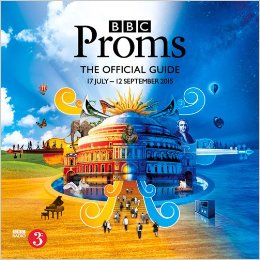
If you want to find premieres at the 2015 BBC Proms you have a couple of options. On the Proms website, there is a list of all the composers featured. If you then follow the link to a living composer then there is a good chance that their work will be a premiere of some description. Alternatively, for £2.99, you could invest in the BBC Proms app available for iOS and Android. It has 18 articles and 22 artist spotlights, a list of ‘collections’ (e.g. ‘For families’, ‘Late Night Proms’ etc.), a calendar and the ability to search by event, composer, piece or artist. One of the articles lists premieres alphabetically by composer. What doesn’t seem to be available either on the web or in the app is a list of premieres by date, making it not so easy to plan your listening if this is the thing that really interests you. Here then are all the Proms premieres in exactly that way, with my compliments:
July
17th: Gary Carpenter Dadaville, World Premiere
19th: John Woolrich Falling Down, London Premiere
20th: Cheryl Frances-Hoad Homage to Tallis, World Premiere
HK Gruber into the open…, World Premiere
22nd: Hugh Wood Epithalamium, World Premiere
25th: Pierre Boulez Notations 2, 11 & 10; La treizième (arr. J. Schöllhorn), UK Premiere
27th: Luca Francesconi Duende – The Dark Notes, UK Premiere
August
1st: Luke Bedford Instability, World Premiere
2nd: Anna Meredith Smatter Hauler, World Premiere
3rd: James MacMillan Symphony No. 4, World Premiere
Colin Matthews String Quartet No. 5, European Premiere
7th: Messiaen Un oiseau des arbres de Vie (Oiseau tui), World Premiere
Ravel Miroirs – Oiseaux tristes (arr. C. Matthews), World Premiere
8th: Tansy Davies Re-greening, World Premiere
9th: Jonathan Newman Blow It Up, Start Again, European Premiere
10th: Bertram Wee Dithyrambs, World Premiere
John Psathas View from Olympus, World Premiere (of this version)
16th: Michael Finnissy Janne, World Premiere
21st: Anders Hillborg Beast Sampler, UK Premiere
25th: Raymond Yiu Symphony, World Premiere
27th: Ørjan Matre preSage, World Premiere (of this version)
29th: Christian Mason Open to Infinity, UK Premiere
September
3rd: Tommy Andersson Pan, BBC World Premiere
6th: Guy Barker The Lanterne of Light, World Premiere
12th: Eleanor Alberga Arise, Athena!, World Premiere
0 comments
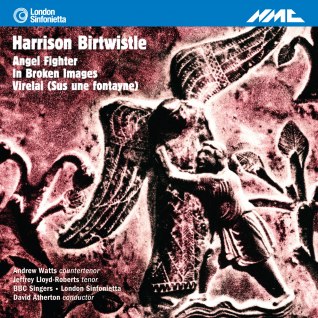
As well as Boris Pigovat’s Requiem (see below), Naxos have release two solo disks, one of guitar works by Sofia Gubaidulina, including the substantial Repentance and Sotto Voce; and a three-disk selection of piano music by Kaikhosro Shapurji Sorabji. On two disks, meanwhile, is Richard Danielpour’s five movement symphony Darkness in an Ancient Valley, inspired by recent events in Iran, and his oratorio Toward a Season of Peace. Verses and Nocturnes is a programme of songs by Pinho Vargas, consisting of 9 Cancoes de Antonio Ramos Rosa, Nocturno / Diurno, 3 Versos de Caeiro and 7 Cancoes de Albano Martins. All are world première recordings. There is also a selection of orchestral works by Xu Shuya, a ‘New Wave’ composer from China.
Two electroacoustic works by Morton Subotnickis, After the Butterfly and The Wild Beasts, have just been released on Wergo and are available on Spotify. I’ve dipped into the album and like it a lot, it is witty and well-judged, with the many interesting effects not submerging a sense of more purely musical momentum. Also on Wergo is a disk of Lieder by Mikis Theodokaris, released in celebration of the composer’s 90th birthday (which falls on 29th July); a two-CD collection of the string quartets of composer/clarinetist Jörg Widmann; and four ensemble works by Swiss composer Michael Pelzel.
In the UK NMC have just released Angel Fighter, In Broken Images and Virelai (Sus une fontayne) by Harrison Birtwistle. Extracts are available on the website and the whole disk for streaming on Spotify. Rather different in style, but also available for streaming, are Michael Hurd’s two operasThe Aspern Papers and The Night of the Wedding. He’s not a well-known figure but the works deserve a wider audience. DG, finally, have just released New Seasons which contains Philip Glass’s Violin Concerto No. 2, Arvo Pärt’s Estonian Lullaby, Giya Kancheli’s Ex Contrario and Shigeru Umebayashi’s Yumeji's Theme.
0 comments
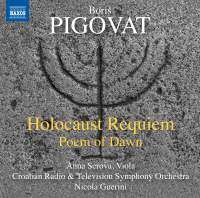
Knowing little about his style, it was with a little trepidation that I listened to Boris Pigovat’s Holocaust Requiem (just released on Naxos), a title that evokes much historical and musical baggage.
Perhaps sensing the difficulty in responding to events as horrific as those of the Holocaust Pigovat chooses, instead, to write for solo viola and orchestra, basing the movement titles themselves on the sections of the Requiem Mass in a manner that most obviously recalls Britten’s Sinfonia Da Requiem. Unlike the Britten, however, he preserves the traditional order of Requiem Aeternam, Dies Irae and Lacrimosa, finishing with the traditional Lux Aeterna (absent in the Britten).
Stylistically the music shares a great deal with Britten’s contemporary, Shostakovich; the opening has something of the long-breathed lamenting quality of, say, the end of his String Quartet No. 8, whilst the powerful Dies Irae is, like many of the Russian’s fast symphonic movements, bitterly sardonic. Also like Shostakovish, Pigovat displays considerable stylistic ‘range’; whilst the thrilling Dies Irae frequently teeters on the brink of tonal chaos, the Lux Aeterna, though dark and lamenting to begin, gradually emphasises the quality of light (Lux), ending on a series of coloured major chords before a final, more questioning, gesture. He does this whilst skilfully skirting around, and avoiding, the saccharine. It’s a moving and rewarding journey and one that, despite the stylistic parallels outlined, carves its own path, especially since it falls into none of the familiar Requiem camps.
0 comments

July sees the beginning of two long summer festivals. The BBC Proms runs from 17th July to 12th September, with the first night world première honours going to Gary Carpenter’s Dadaville. I’ve counted a total of 29 other premières of one description or another. The proms website, as ever, doesn’t do a very good job of highlighting these, so I’ll do a separate CT guide towards the end of this month.
The Salzburg Festival starts the day after the Proms, on 18th, and continues until 30th August. The focus is mainstream classical repertoire, though the nine concert Salzburg Contemporary series will this year focus on the works of Pierre Boulez, including Le Marteau sans maître, his three piano sonatas together with the original version of Notations, and Répons. There are also a substantial number of works by other contemporary composers as part of these concerts. Performers – including Pierre-Laurent Aimard, Ensemble Intercontemporain and JACK Quartet –are all top drawer. This mini-festival doesn’t actually kick off until 30th, so there is plenty of time to plan a visit.
There are several interesting music events as part of the biennial Manchester Festival (2nd–19th). Damon Albarn’s new musical wonder.land, inspired by Alice in Wonderland, previews from 29th June–1st July with performances running from 2nd–12th July. Actually a play, The Skriker by Caryl Churchill (performances throughout the festival) features incidental music by Nico Muhly and Anthony. Mark Simpson’s new work The Immortal explores ‘the obsession with death that lies at the heart of human experience.’ Written for orchestra, choir and solo baritone it will be performed alongside Mozart’s Requiem on 4th. Running from 9th–19th will be the fruits of a creative partnership between Arvo Pärt and artist Gerhard Richter (whose striking works I saw, and enjoyed, in a large exhibition in the Beyeler Foundation, Basel in 2014). A suite of four new works by Richter, Ashes (2015) and his Doppelgrau (2014), will be presented with Pärt’s Drei Hirtenkinder aus Fátima in the newly renovated landscape gallery of the Whitworth. The music of Pärt will also feature in a separate concert on 12th.
The Bregenz Festival (22nd July–23rd August) is almost as long as the Salzburg Festival, the repertoire more mainstream; the festival is dominated by performance of Turandot, The Tales of Hoffmann and Cosi fan tutte. The one exception, however, is Peter Eötvös’s opera Golden Dragon which will receive performances on 19th and 21st August. There is, similarly, contemporary opera amongst more conventional fare at the Festival d’Aix-en-Provence, namely a performance Jonathan Dove’s ‘opera for all ages’ The Monster in the Maze on 8th and 9th July and Ana Sokolović’s Svadba on various dates from 3rd–16th.
Some other festivals worth checking out, especially if you’re nearby:
Cheltenham Music Festival (30th June–11th July): Perhaps not so much contemporary music on offer as in previous years, but a rummage around will reveal some offerings in the 2nd, 7th, 12th, 15th, 18th, 21st, 31st and 33rd concerts (each concert is prefixed by an ‘M’ in the website concert listing i.e. M2, M7, M12 etc.).
Buxton Festival (10th–26th): ‘A happy marriage of opera, music and books’. Programme is arranged by performer here, click on the description for more information about composers.
Schleswig-Holstein Music Festival (11th July–30th August): Another long summer festival, this year focusing on the music of Tchaikovsky.
Kuhmo Chamber Music Festival (Finland, 12th–25th): Quite a range of repertoire on offer, including Varèse, Messiaen, Kryštof Mařatka, Jacob ter Veldhuis, Sofia Gubaidulina, Berg, Britten and Stravinsky.
0 comments
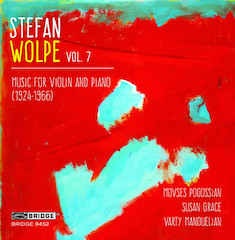
Though back in Pembrokeshire after three months at the Paul Sacher Sitting in Basel, a recent CD release brought to mind an uncomfortable event that occurred whilst I was there.
I am constantly reminded how little I know when I am at the PSS, a healthy facet of being in an environment surrounded by experts in different fields of musicology. It can, nevertheless, be quite alarming to think you have a decent grasp of twentieth century musical history only to come across a famous composer that you haven't even heard of. Having stuck up a conversation with a very lovely musicologist I asked the standard question: ‘Who are you studying here?’ She answered 'Stefan Wolpe', a name, I was embarrassed to admit, that I had never come across.
He is an interesting figure (I know now), having been an actively political, left-leaning Jew in pre-war Germany, a fact that, not surprisingly, led to him fleeing the country after the Nazi ascension to power in 1933. This led to a short period studying the serial method with Webern in Austria, before fleeing again to Palestine and later to the U.S. Musically he was never as strict in his use of serialism as his teacher – he remained interested in other pitch systems, including tonality and octatonicism – and also displayed an interest in popular forms, especially jazz.
If you are new to his music a good place to start is on Bridge Records, who have just released the seventh volume of a survey of his works. This contains a selection of music written for violin solo, violin duo and violin and piano. The major work on the disk is his 1949 Sonata for Violin and piano which, written after taking U.S. citizenship, he described as ‘one of the first pieces which show my personal liberation.’ Despite this there are strong signs of his Germanic roots, especially in its uncompromising harmonic style and finely considered motivic working. Interestingly a fragment from the later Second Sonata, also on the disk, shows, if anything, a strengthening of the Germanic influence; the pointillistic style of Webern being never far away.
A dig around other releases (many of which can be found on Spotify) in the Bridge Records series reveals other facets of the composer’s style. Volume 3, for example, opens with the charming children’s puppet show tale Lazy Andy Ant, ending with the catchy Songs of the Jewish Pioneers and the fruitily tonal To a Theatre Now. Even here, however, there is more challenging fare on offer, such as Two Songs for Baritone. Such shifts of stylistic gear can make Wolpe a difficult composer to characterise, though set in the context of his experiences as a refugee – in every place he visited he absorbed something of the music – they begin to make sense.
Happily, and despite such shifts, the music remains, as far as I have heard, remarkably even in quality. And stylistic variation has its advantages: whatever you personal preferences, there is likely to be some Wolpe that you will like.
0 comments

Exciting times in the world of music streaming. Last night Apple announced the not-very-imaginatively-titled Apple Music, their response to dwindling iTunes sales and the streaming threat presented by companies such as Spotify. The service consists of several parts, though I imagine only one will be of interest to readers here.
‘Connect’ is a kind of social network for music, which will allow artists to share information about their current projects and potentially provide a platform for emerging performers. Time will tell if this gains any traction; Apple have tried music social networking before (the ill-fate ‘Ping’) and it is not as if the internet lacks other such platforms.
Beats 1 is a new internet radio station that will broadcast 24/7 from New York, Los Angeles and London. It’s raison d’être is to be unlimited by genre, playing the very best of well-known and emerging artists.
Beats 1 will focus on popular music. The same is probably true of Connect, which is a shame – it would be nice if contemporary composers thought about sharing information about current projects, or emerging composers had a promotional platform. Those decisions are in the hands of artists, I suppose, so one shouldn’t rule it out, though contemporary classical and Apple don’t seem an obvious mix.
Most aspects of Connect and Beats 1 will be free within the app. Users will also be able to purchase music from iTunes in the normal way and, I presume, to have continued access to any music ripped with iTunes Match. Also, and this is where things get truly exciting, for $9.99 single membership or $14.99 for a family of six (U.K. prices not yet confirmed), one can stream music from Apple. It is not entirely clear at this stage whether this includes all of the music currently available to purchase. If this is the case Spotify is in for a rough ride, since Apple’s classical catalogue is definitely more comprehensive. Unlike Spotify there is no advert supported streaming option, but there is a three month free trial and the option to download tracks for offline use.
I will post more thoughts when the service is available to try: the release date is 30th of this month.
0 comments

Holland Festival (Holland, Amsterdam) 30th May–23rd June
The Holland Festival takes place in numerous venues in Amsterdam and features dance, film, the visual arts, theatre and also a wide range of concerts, many of which feature new music. This year there is a particular focus on the music of Pierre Boulez, in concerts and also more exploratory events.
On 1st Jean-Guihen Queryas is joined by students of the Musikhochschule Freiburg to give a lecture recital on Boulez’ Messagesquisse for solo cello and six cellists. There is also a series of concerts on 4th and 11th in which students of the Royal Conservatoire perform reinterpretations of early Boulez works and, on 14th, a concert performance of Répons, Boulez’s first work combining traditional instrumentation and real-time manipulated sound. Beyond the Score, on 2nd, meanwhile, features a set designed by architect Frank Gehry on which key works from Boulez’s œuvre are played together with with letters, poems and archival footage.
 Aldeburgh Festival (Snape, UK) 12th–28th June Aldeburgh Festival (Snape, UK) 12th–28th June
There is also a chance to see a version of the Gehry/Boulez project at the Aldeburgh Festival on 17th, where it is called A Pierre Dream: A Portrait of Pierre Boulez and features the Royal Academy of Music Manson Ensemble conducted by Susanne Mälkki. The same ensemble will also perform his Improvisation sur Mallarmé I and II on 19th.
The major première at the festival this year is Harrison Birtwistle’s new opera The Cure on 12th, 14th and 15th. The libretto, by David Harsent, is inspired by classical mythology and will be paired with their earlier collaboration The Corridor.
Other premières include Martin Sucklings Visiones in a late-night concert on 20th and Saed Haddad’s In Contradiction for two cellos and ensemble on 25th. The latter also features works by Birtwistle, Knussen, Benjamin and Ligeti. Also intriguing is the world première performance on 24th of Tal Rosner’s new video accompaniment to Britten’s Four Sea Interludes and Passacaglia. That concert is also worth attending for the chance to hear Helen Grimes’ Everyone Sang.
 St. Magnus International Festival (Orkney, UK) 18th–25th June St. Magnus International Festival (Orkney, UK) 18th–25th June
Featuring concerts, theatre, food and drink, films and education projects the St. Magnus International Festival is, of course, most synonymous with the music of its founder Peter Maxwell Davies. On 20th there will be the chance to hear the world première of his new work for solo violin, with other new pieces by Sally Beamish and Adrian Sutton. His Ebb of Winter will also be played by the Scottish Chamber Orchestra on 21st. Also on 21st is festival director’s music for Greenvoe, featuring the prose of George Mackay distilled by Festival Poet Stewart Conn.
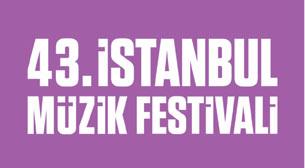
Istanbul Music Festival (Istanbul, Turkey) 31st May–29th June
The 43rd Istanbul Music Festival consists of 27 concerts and 5 premières. These include the world première of Hasan Niyazi Tura’s symphonic poem commemorating the 100th anniversary of the Gallipoli War in the opening concert held on Sunday and Armenian composer Tigran Mansurian’s In memoriam Komitas Vardapet for viola and piano on 10th.
0 comments
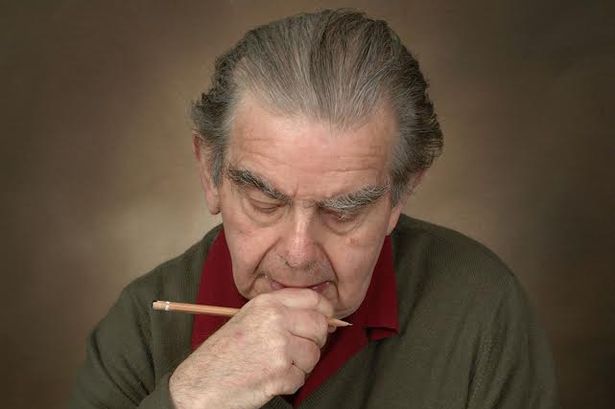
Many readers will not have heard of Mervyn Burtch, a Welsh composer who died on 12th May aged 85. For Welsh musicians his is a very familiar name indeed. His practical attitude to composition – the belief that a composer should serve his community – resulted in a large body of work, a significant proportion of which was written for amateurs and children. In this way Burtch touched the lives of many Welsh people.
Burtch hailed from Ystrad Mynach, attending Lewis School at Pengam, where he was taught by the composer David Wynne, a key early influence. His career also followed a similar path: he became Head of Music at Lewis School for Girls before teaching at the Welsh College of Music and Drama from 1979. It was probably his experience as a schoolteacher that enabled him to write so effectively for young people.
In an age when composers agonise over their style, Burtch, it at least appeared, had few such doubts, producing more than 650 works over his long life, including 17 string quartets, 14 concertos and numerous youth operas, choral and brass band works. In reality his style, accurately described elsewhere as ‘brisk, clear and concise, with an instantly recognisable voice’ was the product of hard-won professional determination. Neither should his fecundity obscure the fact that, especially in his more introspective works, his musical language could be stark and challenging.
Burtch will probably be best remembered for his youth operas, a product especially of the Welsh College of Music and Drama Schools’ Opera Programme, which he directed. These include works based upon well-known tales, such as The Pied Piper (his first opera for schools, written whilst still a teacher) and Alice in Wonderland (1997); others suggesting elements of Welsh culture, as in The Dragon of Abercwmgoch (1984); or the much more outlandishly titled Percy the Martian (1988) or Sam Sparrow and the Coca Cola Well (1992). His reach into youth music making wasn’t just through the medium of opera, however: there was also a substantial quantity of amateur music for choirs and brass band.
My own first experience of his music was playing second cornet in the première of his Concerto for Piano, Brass and Percussion in the National Youth Brass Band of Wales. What was interesting, looking back, is that the work was an intensely serious one with, as I remember, a dark, brooding slow movement and a finale of sardonic Shostakovich-like energy. His success in writing for amateurs was a product of him understanding what was and wasn’t possible whilst, at the same time, not compromising his style.
Others have written of his kindliness and unassuming nature. I had lunch with him once at the age of 17, also in the company of A.J. Heward Rees, who was then Director of the sadly now defunct Welsh Music Information Centre. I was incredibly impressed to be meeting a real composer and, I think, a bit tongue-tied. He was easy-going, natural and incredibly encouraging. I saw the same thing some years later during the rehearsals for The Pied Piper in 1999, where he patiently played piano for rehearsals of a little group of very young players in the Welsh College of Music Pre-Junior Department.
Given that Burtch became such a fixture in Welsh musical life, it seems astonishing that the discography of this composer is so limited. On Spotify I am able to locate only one recording, his Aladdin Overture, which shows the composer at his most urbane and fluent, but does not give a fair view of his compositional range. For more introspective Burtch try the Four Portraits of Alice in Wonderland (1982, rev. 1993) or his Dream Sequence (1986) for horn and piano. If you can track them down there is also a short collection of his choral music, recorded by the Cardiff Polyphonic Choir, and also individual works on collections of other (especially Welsh) music, including his Prelude, Arioso and Dance, Three Welsh Folksongs and Sonatina.
For more information
Telegraph Obituary
Wales Online Obituary
Mervyn Burtch Trust
Wikipedia Entry
0 comments
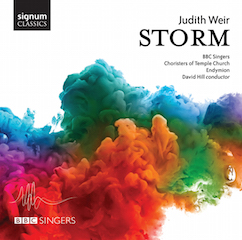
Storm is Signum Classics’ new disc of Judith Weir vocal music performed by the BBC Singers under David Hill. It consists of All the Ends of the Earth, for chorus, percussion and harp; her set of evening canticles, written in 2011 for St. John’s College, Cambridge; Missa del Cid; The Song Sung True; and Storm.
Weir’s ability to render the familiar new is often remarked, especially in her propensity to deploy tonal/modal elements in a manner that avoids cliché. That is everywhere apparent here, the language being accessible without dumbing-down. Her ability to renew also extends into other areas. Whilst the Magnificat and Nunc Dimittis takes a traditionally compact approach to the setting of the evening canticles, two of the other works offer a rich reimagination of existing forms. The Missa el Cid is a mini opera, one in which the confrontation between the words of the narrator, the liturgy and the text of the 13th century Cantar del Mio Cid provide a striking dramatic tension. All the Ends of the Earth manages a similar feat, this time reworking elements Perotin’s Viderent Omnes into a work of ravishing polyphonic beauty in which the spirit of earlier composer is, nevertheless, never far away.
The last work on the disk is a reminder of Weir, the practical community composer. Originally written in response to a commission from a local schoolteacher to set Shakespeare’s Our revels now are ended, it grew into a longer work of five movements for SSAA+treble chorus and 9-piece ensemble. It is music of poised beauty in which the spirit of Britten’s best music for amateurs never feels far off. The performance, in which the purity of the Choristers of Temple Church so effectively contrast with the rich sounds of the BBC singers, is a delight.
0 comments
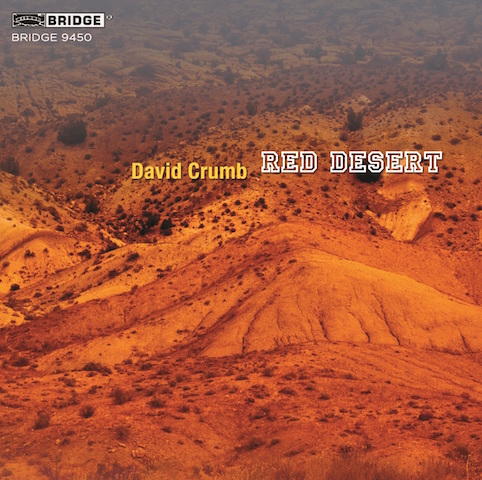
Time to dismantle the hustings, take off rosettes and breathe a sigh of relief that the UK election, possibly the most tedious campaign I can remember, is finally done with. At least the end was exciting, though I hate to think of what it harbingers for the future of the UK. It’s good today to be back looking at musical things: a pretty good range of new CD releases.
On Bridge Records Paul Lansky’s Contemplating Weather is a choral cantata commissioned to celebrate the 100th anniversary of Western Michigan University School of Music. As the title suggests, it sets poems that examine various facets of climate. The style is attractive, though a little anodyne for my taste. Don’t let that stop you making up your own mind, however. On the same label, David Crumb’s new disk contains four chamber works, the most substantial of which, the three movement Red Desert for Baritone and Piano also lends its title to that of the album. There is plenty of meat on offer here, from the witty dialogue of Soundings to the vast contemplative spaces of Rock Cathedrals (first movement of Red Desert). It is well-written music, not afraid to embrace a wide harmonic range. Worth exploring.
Such advice also applies to two new disks on Signum, which, like the aforementioned, can also be Spotified. I’m going to write a little more about Judith Weir’s new choral disk Storm in a separate blog post, safe to say that I am enjoying it a great deal. Also just released is Tamsin Waley-Cohen’s programme of music for solo violin, which consists of works by Bartok, George Benjamin, Penderecki, Carter and Kurtág. I’ve only dipped into this. It’s serious and astringent fare, but rewarding for the same reasons.
On Naxos a new Penderecki album consists of two choral works, his Magnificat and the much later (and therefore less avant garde) Kadisz performed by the Warsaw Boys’ Choir, Philharmonic Choir and Orchestra under Antoni Wit. There is a disk of orchestral works by Zhou Long, including his Symphony Humen 1839; Joan Tower’s Violin Concerto, Chamber Dance and Stroke; Pinho Vargas’s opera Os Dias Levantados, an exploration of the coup of 1974 that ended Portugal’s fascist regime; the latest issue of Naxos’s series of orchestral music by Gian Francesco Malipiero, most substantially containing his Sinfonia degli eroi (Symphony of Heroes); and, more lightheartedly, a reissue of the definitive restoration of Korngold’s music for the 1938 Warner Bros.’ production of The Adventures of Robin Hood.
A couple of other Spotifiable options to finish. Dutton Epoch have just put together a 3 for the price of 2 deal on a collection of works by Arthur Butterworth, a Manchester-born composer who died in 2014. Symphony No. 1 and 4, and the Viola Concerto, plus an interesting monologue from the composer talking about his life and music are available for streaming. The music itself, as the composer says, takes an individualist route, not attempting originality but rather using familiar, especially tonal, elements to forge his style. On Decca meanwhile, there is a new two-disk collection of piano works by Philip Glass played by Valentina Lisitsa. It includes the famous opening to Glassworks, arrangements from the soundtrack to The Hours and Metamorphosis 1-5.
0 comments

I was sorely tempted to head from Basel to Prague in May: a month in a beautiful (and relatively cheap) European city with a major music festival sounded promising. As well as a wealth of other repertoire played by world class performers, new music events at the 70th Prague Spring Festival include: a revival of Ľubica Čekovská’s opera adaptation of Oscar Wilde’s The Picture of Dorian Grey on 19th; the Prague Philharmonic Choir singing John Tavener, Arvo Pärt, Veljo Tormis and Eric Whitacre on the same day; the Czech premiere of Einojuhani Rautavaara’s Apotheosis from Symphony No. 6 on 21st; and Berio and Britten on 23rd and 27th. Unfortunately my commitments will keep me here, but, if you’re tempted, there’s still plenty of time to organise a visit; the festival runs from 8th–3rd June, (though the first few days are a flute and clarinet competition, the official opening concert being on 12th).
The York Spring Festival is looking to create a carnival atmosphere in the city over the course of the weekend of 9th–11th May, with a spirit of exploration and openness to all genres. There are some imaginative events on offer. On 9th Latrabjarg: an Ecological Requiem for electric cello, counterternor and chamber ensemble by James Cave and Christopher Mullender explores loss of culture and the natural world; the Dark Inventions’ concert on 10th mixes folk song with music by British composers, including the the work Firewheel by Philip Cashian. On 11th there is a morning of new music debate and discussion, the day being rounded off by a Nonclassical Contemporary Music Club Night at 9.30pm.
The Vale of Glamorgan Festival (12th–23 May) takes place in a variety of venues in South East Wales. This year the focus is on celebrating Arvo Pärt’s 80th birthday, with performances spread throughout the festival programme. There will also be the chance to hear music by British/Bulgarian composer Dobrinka Tabakova, including her Fantasy Homage to Schubert, Frozen River Flows, and the UK premieres of Such Different Paths and Of the Sun Born. World premieres include Between the Waves by Tom Green and Xiao Ying’s Septet. Other living composers represented include Peter Reynolds, John Adams, Richard Ayres, Tan Dun and Jaan Rääts. On 12th there is also a New Music Day, where the Nieuw Ensemble will play compositions by emerging composers at the Royal Welsh College of Music and Drama.
The English Music Festival (22nd-25th) focuses largely on an undeservedly neglected seam of repertoire: more conservative English composers of late 19th and 20th centuries, including figures such as Havergal Brian, Vaughan Williams, Alwyn, Parry, Stanford and Howells. There are also a couple of world premieres and a concert of music given by composer/pianist Lionel Sainsbury.
Some other festivals worth exploring in May, especially if you are nearby include: the Techtonics Festival (1st–3rd) in Glasgow; the Norfolk and Norwich Festival (8th–24th); the St. Davids Cathedral Festival in Pembrokeshire, Wales (22nd–31st); the Northern Chords Festival in Gateshead, Durham, Corbridge and Newcastle upon Tyne (25th–30th); and the Holland Festival (30th May–23rd June) in Amsterdam.
A quick heads up that the Proms programme is now published. You can see it here.
Also two Helen Grime world premieres worth seeking out: her Concerto for Clarinet and Trumpet will be performed on 7th May at Bridgewater Hall Manchester by the Halle with soloists Lynsey Marsh (clarinet) and Gareth Small (trumpet); a new String Trio by The Chamber Music Society of Lincoln Center at Wigmore Hall on 8th.
0 comments

There’s a trio of contrasting discs on Signum Classics this month. Flight is a collection of works by Oliver David (b. 1972) performed by violinist Kerenza Peacock with the LSO. It’s colourful if pretty light fare, music to be consumed. If you like the style but prefer something a bit more profound, you could check out Bob Chilcott’s dramatic St. John Passion with Wells Cathedral Choir conducted by Mathew Owens. Both recordings are available on Spotify. For the more adventurous I recommend Signum’s disk of chamber music by Thomas Adès. It contains his metrically dazzling Piano Quintet; Arcadiana, most remarkable for its moving homage to Elgar in its sixth movement O Albion; and The Four Quarters, which uses the daily cycle as its central metaphor.
Towards the end of his life John Cage wrote a series of works entitled Two. The number refers to the number of performers, with a superscript suffix (Two1, Two2 etc) denoting the piece within the series. WERGO has just released the performance of Two3 for Japanese shō and conch shells. The only performance I have heard of the work lasts for ten minutes, so I’m not sure how it becomes the two-disk epic presented here. Possibly for die-hard fans only. Also just released on WERGO is Giacinto Scelsi’s Suite 9 and 10 for piano performed by Sabine Liebner and a collection of organ music by Gerhard Stäbler. The latter takes it’s name from one of the pieces on the disk, Heiss! I’ve heard this wacky and experimental work, which is so full of original and fascinating sounds you barely realise you are listening to the king of instruments.
Two discs of electronic music. On Nimbus there is a three CD + 1 DVD complete collection of electro-acoustic works by Douglas Lilburn (1915-2001), who is often considered to be the father of New Zealand music. The disc derives its rootedness by using found musical material from the New Zealand environment. Audio tracks from the collection are available on Spotify. Also using found material is Karen Power’s it is raining while you listen, a series of frozen sonic moments for electronics/electronic+acoustic instruments. It is released by Farpoint Records in an attractive limited edition with poetry, texts and photographs commissioned by the composer.
Keep an eye out, finally, for the soon-to-be-released disk Wild Cyclamen on NMC. It contains songs by Hugh Wood exploring the themes of youth, love, lust and longing in settings of poetry by DH Lawrence, Laurie Lee, Robert Graves and Lawrence Durrell.
0 comments

Whilst flicking between record label websites this afternoon, I came across the Composed app, a collaboration between Classic FM, Decca and Deutsche Grammophon that presents a curated list of classical music for £4.99 per month. I was unable to download the desktop version, which requires you to be in the UK, but my login to the Apple App Store seemed to be enough to persuade them of my Britishness. There doesn’t appear to be an Android version, which is short-sighted.
The feel of Composed is very ‘Classic FM’, with a high degree of emphasis on the core classical repertoire organised by moods, collections and composers. It all feels a bit dumbed-down if you’re an experienced consumer of classical music, though I liked the emphasis on searching by composer – if you prefer classical music this is how you choose a piece. It is a mistake, however, not also to allow searches by performer. It’s a decision, just like the trumpeting of ‘curation’, that feels like an admission that the collection lacks depth; the presence of only two record labels means that this is no Spotify.
Where the app might be useful is for those with a budding interest in classical music. The ‘moods’ and ‘collections’ sections are a lot of fun and contain heaps of good music, including the entire Classic FM Hall of Fame. There’s even a ‘Nervous Newcomer’ playlist, which contains a series of familiar lollipops to draw people in. And when you start digging deeper you can find some quite challenging stuff. There’s music by Boulez, Berio, Birtwistle, Cage, Henze, Varèse, Berg, Webern etc. I’m all for finding ways of introducing classical music to the masses and then maybe gradually winning them over to more recent fare.
The problem for Composed, however, is that Spotify also does themed playlists. Granted, it’s not as slick and Spotify costs twice as much, but you then get a far more comprehensive collection of classical music, plus the added bonus of having other genres – pop, blues, rock etc – available. As such, it’s difficult to recommend Composed, though, if you’re interested, the app gives you free access to its collection for a month, which by itself might make it worth investigating.
0 comments

Conversations is John Palmer’s new book published by Composer’s Edition in partnership with Palmer’s own enterprise, Vision Edition. It contains 20 conversations with major figures in contemporary music: 13 composers, 4 players, a conductor, tonmeister and founder of a music archive. It is an impressive list of names, including figures such as John Cage, Jonathan Harvey, Michael Finnissy, James Wood, Luc Ferrari, Richard Barrett, Evelyn Glennie and Nuria Schönberg-Nono.
Palmer is very deliberate in preferring the term ‘conversation’ to ‘interview’ – certainly the tone that comes across throughout is one of an exchange of ideas between friends. That said, the conversations don’t ramble. Most begin with questions about background and musical formation, leading to more specific questions as the conversation develops. Palmer manages this unfolding expertly.
The oft-repeated structure allows readers to gain useful perspectives. It is fascinating, for example, to see the varied routes by which each of the composers came to music. There’s the more traditional choir and organ background of Harvey and Wood and then those with much less conventional early years. Richard Barrett and Daniel Teruggi, for example, became composers relatively late in life, both having being primarily interested in science.
Palmer also does a good line in reusing more imaginative questions, which can be just as revealing of his own interests and motivations. These range from technical information about a composer’s electronic setup, to his frustrations about musicians’ inability to perform aleatoric scores. My favourite concerns Palmer’s belief that music has an intrinsic power to change people; he is convinced ‘that an accurate listening experience may not only stir new perceptions of life, but also trigger a radical change of consciousness…therefore, by multiplication, it can initiate a potential change in the world.’ It’s an interesting idea that provokes fascinating responses.
In the more specific questions it is abundantly apparent that Palmer both knows his stuff and has done his homework. He asks Wood about his coming across Aristoxenes’s treatise Stoicheia Rhythmika in the 1980s and the effect on his music, a vital key, it turns out, to understanding his development. He takes Harvey through all the key moments in his musical formation and understands the importance of Rudolf Steiner and the influence of Eastern religions upon his work. There are, likewise, penetrating questions about Richard Barrett’s socialism, Finnissy’s eclecticism, the influence of Borges on Casserley, the influence of Japanese music on Jim Franklin, mathematics in the music of Elliott Sharp.
Neither is Palmer afraid to ask difficult questions. Conductor Celso Antunes remarks at one point that ‘there are developments [in new music] which I find frankly boring and sometimes completely nonsensical in musical terms.’ With an elegantly polite preamble Palmer asks ‘I would like to know which music directions you perceive as being nonsensical and why? Can you be as specific as possible, please?’ There is a frank and revealing discussion with Evelyn Glennie about the loss of her hearing and some beautifully tongue-I think-in-cheek exchanges with John Cage. With the later, for instance, the questions ‘Do you actually hear the sounds you write while you are composing?’ and ‘You once said you don’t have a feeling for harmony. Is that really true?’ provoke unexpected and hilarious responses.
John Cage is, indeed, one of the ‘superstar’ conversations that will rightly attract people to this book. Others highlights include the wide-ranging and substantial interviews with Jonathan Harvey, Michael Finnissy, Evelyn Glennie and James Wood. I loved the spontaneity and energetic fun of Luc Ferrari’s conversation, despite the trouble he had speaking in English, and Nuria Schönberg-Nono offers a unique perspective on twentieth-century music, having been both the daughter of Schönberg and wife of Luigi Nono. Her role as a founder of a musical archive also has resonance for me here in Basel, with my daily visits to the Sacher Foundation. As well as these grand figures, however, you should read this book for those that you know less well or not at all. The interviews will have you scurrying to your computer to look for more information and musical extracts.
A number of the interviewees are particularly known for their electroacoustic and acousmatic composition. Some may find that limiting, but it is to mistake the purpose of the book: it doesn’t pretend to be a neat cross-section of contemporary composition. Palmer also has considerable experience in this area – a significant minority of his own output being for the medium – and this puts him in a good position to be able to ask the right questions. The result is that many of these conversations powerfully advocate a too often neglected field of contemporary composition.
Some of these conversations have already been published in music journals. If you are a regular subscriber or have access through JSTOR you might want to double-check how much overlap there is. For those without access, or even those who would like to have these fascinating, illuminating and entertaining conversations in one place, the book is an easy recommendation.
0 comments
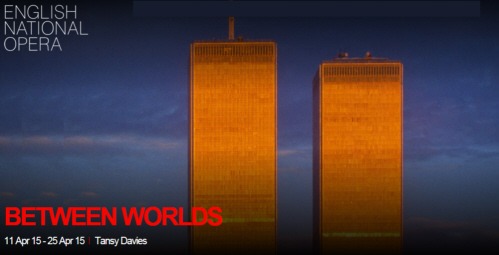
A concert last night by students of the Hochschule für Musik revealed much about standards in Swiss higher education. The ambitious programme contained Cage’s First Construction (In Metal) and Six for six percussionists, Feldman’s Instruments II, Improvisations sur Mallarmé II (No. 3 from Pli selon pli) and Ligeti’s Piano Concerto.
The two Cage works are eminently performable by students, as was proved. I need not have been so sceptical that they could pull off the Boulez and the Ligeti, however. The two soloists coped brilliantly with the distinct virtuosic requirements of each work: soprano Céline Wasmer singing Boulez’s difficult lines with otherworldly expressivity; pianist Krill Zwegintsow providing machine-like stability in the Ligeti. Student Ensemble Diagonal likewise provided sensitivity in the former, thrillingly focus in the latter. Only in the Feldman did the need for fine control tax the players to the point where it was in danger of interfering with the meaning of the music. And this hardly surprised; the Feldman, which is a long span of pianissimo entries, often in difficult tessituras, requires phenomenal control. Conductor Jürg Henneberger, who is obviously a bit of a fixture here in Basel (he also conducted the Ensemble Phoenix concert on 16th), did a superb job leading these youngsters.
Tomorrow, the Hochschule in cooperation with OperAvenir, give their first performance of a new production of the Rape of Lucretia at Theater Basel. It’s one of the few Britten operas I don’t know at all, so I hope to visit before the end of the run on 25th April.
Talking of opera, 11th April sees the world première of Tansy Davies’s Between Worlds with ENO (performing at the Barbican, not the Coliseum). The title of the work derives from the dreadful scenario it describes: a group of people are trapped in one of the World Trade Center Towers, above where it has been hit and therefore unable to descend. They are, quite literally, ‘caught between earth and heaven, life and death.’ There are a total of eight performances the last being on 25th April.
There are two chances in the UK to hear works by emerging composers. The first is at Hoddinott Hall, Cardiff on 1st April, where selected composers from the workshop stage of the Composition:Wales project will have their pieces performed by BBC NOW under Jac van Steen. Meanwhile in London the LSO Soundhub project will perform chamber compositions by Maxim Boon, Laurence Osborn, Helen Papaioannou, Robert Szymanek, Laurie Tompkins and Aaron Holloway-Nahum; all of whom are in the second year of their membership of the scheme.
The Budapest Spring Festival runs from April 10th–26th. As well as more standard orchestral fare, there are a few premières on offer. On 24th April there is there first chance to hear Péter Nógrádi’s Partita - Four paintings by Csontváry for the string orchestra, Zoltán Kovács’s Pictures of Taormina and László Dubrovay’s Csontváry - 3 symphonic images for orchestra. There are also works by Miklós Kocsár and Péter Tóth. The day after is the Hungarian première of Gyula Fekete’s piano concerto The Dream of the Red Chamber.
Other notable premières this month include James Macmillan’s St Luke’s Passion at the Barbican on 5th (London première); Robert Matthew-Walker’s Sonata No. 2 for violin and piano (world première) at Wigmore Hall on 12th; Jake Heggie's Camille Claudel: Into the Fire (European première) at the Barbican on 14th; David Matthews’ Symphony No. 8 (world première) at Bridgewater Hall on 17th; Georg Friedrich Haas’s Atthis (UK première) at Royal Opera House on 23rd–25th; and Christopher Rouse Prospero’s Rooms (UK première) at the Barbican on 24th. The New York Philharmonic are also in London around the middle of the month, bringing with them a taste of their Contact! series in the form of works by Daniel Bjarnasson, Timo Andres, Missy Mazzoli, Esa-Pekka Salonen and Shulamit Ran at the Barbican on 18th.
A ‘Happy Birthday’ to Pierre Boulez, who turned 90 just the day-before-yesterday. If you would like to listen to selections from the Barbican Total Immersion day, this is available on iPlayer for the next three weeks. There is also a 45-minute tribute programme with Petroc Trelawny, Paul Driver and Morag Grant. The celebrations of his work continue into April with Peter Eötvös conducting Livre pour cordes and Rituel in memoriam Bruno Maderna with the LSO at the Philharmonie de Paris on 20th and Matthias Pintscher conducting Syrinx, Memoriale and Sur Incises with Ensemble Intercontemporain at the Barbican on 28th.
0 comments
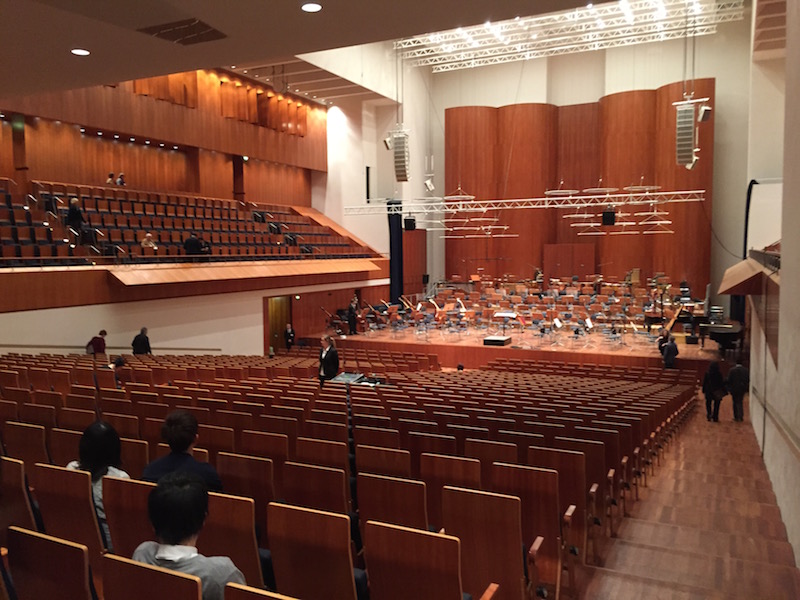
Another couple of interesting concerts here in Basel. I say in Basel, but the first was actually in Germany. One of the curiosities of this city is that its suburbs are in three countries: Switzerland, Germany and France. It goes a long way to explaining why everyone seems fluent in at least three languages.
I headed a bit further into neighbouring territory on 13th, however: to the Konzerthaus Freiburg (see first photo), where the Sinfonieorchester Baden-Baden und Freiburg were playing Lachenmann’s Tableau, Beethoven’s Piano Concerto Nr. 3 and Berio’s Sinfonia.
I was there mostly for the Berio, which I’ve never heard in concert. It was every bit as brilliant as I’d hoped, especially the crazy parody in the third movement of Mahler’s Symphony No. 2. Lachenmann – an immensely tall and impressive figure – was present for the performance of his Tableau. The work, I confess, left me nonplussed. Despite, to borrow a phrase from my more enthusiastic companion, the work being like a beautiful garden of sound, I had difficulty connecting these sounds into a comprehensible whole.
On 16th I headed to Bahnhof für Neue Musik, a little bit, perhaps, like Basel’s version of Nonclassical in London. It has a similar relaxed approach to concert going and makes use of a pretty interesting venue: the Gare du Nord Station near the border with Germany. There is a rather grand, if slightly faded, bar. You are then free to take your drink into the concert area, which used to be the station’s first class waiting room (second photo).
The concert programme consisted of Ensemble Phoenix Basel playing two works by young composers that had been awarded prizes by the group: Vladimir Guicheff Bogacz’s bulle apenas and Matthias Renaud’s Concerto for Piano and Ensemble. Both were written in response to John Cage’s Sixteen Dances, which formed the second half. Of the two, Vladimir Guicheff Bogacz’s was easily the most successful, partly because of the relative reserve with which it deployed the four available percussion players. It was a trap that Matthias Renaud’s Concerto did not, sadly, avoid; the work becoming a chaotic barrage of percussion sounds and extended techniques. It was a relief when the Cage came, which was an object lesson in deploying generous resources, using few notes, to maximum effect.

One curiosity here has been the difference in pricing and audience attendance at the concerts I’ve been to. The large hall at Freiburg, Germany was completely sold out for a concert that consisted of mostly newish music. It cost €11. The Gare du Nord concert was 30 CHF (almost the same in euros); the Feldmann, Ligeti, Stahnke concert earlier in the month was 50CHF (which nearly provoked a wallet attack). These are prices that make me, a person that is enthusiastic about new music, think twice. They seem to have the same effect on others: neither Swiss concert was well attended.
0 comments
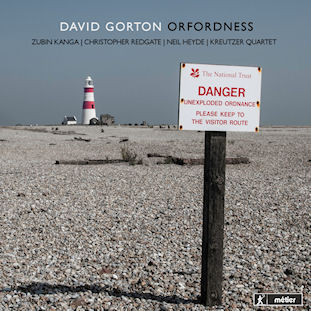
DG have just reissued Boulez’s Le Domaine Musical collection, which can be added to my earlier guide to the composer’s recordings. It features performances from the seminal Paris concerts between 1956 and 1967, including works by Stockhausen, Berio, Messiaen, Varese, Kagel, Henze, Stravinsky, Schoenberg, Berg, Webern and, of course, Boulez. Perhaps, most intriguing of all, is the inclusion of two works by Giovanni Gabrieli, presumably to give context to other compositions on one of the programmes. Gabrieli as sixteenth century modernist, perhaps?
Also just reissued on the same label is Max Richter’s 2004 album The Blue Notebooks both on CD and vinyl, the latter being a sure sign of its popularity. I’d check it out on Spotify first if you are in any way tempted: you will either love or hate its zen-like simplicity.
Two Naxos disks containing chamber music that is neglected for different reasons. The first is a collection of music for violin and piano by little-known composer Alexandre Tansman (1897-1986). If you’d like to get an idea of the style it’s worth checking out his disk of chamber music with clarinet, available on Spotify. It’s not at all what I expected: by turns romantically lyrical, quirkily dissonant and ascetically controlled. Whilst Bernstein is well-known for his musicals and handful of choral and orchestral pieces, a new disk explores some of his music for piano, including an early Piano Sonata and his Anniversaries, a sequence of short pieces written for people close to him. Also on Naxos is a disk of two Malcolm Arnold films scores, The Roots of Heaven and David Copperfield played by the Moscow Symphony Orchestra.
On WERGO Rolf Reim’s new disk contains four works, all of which draw upon story telling and theatricality to achieve their effect. The style is uncompromising but, at the same time, full of lightness and humour. This is particularly apparent in Lenz in Moskau, for trumpet, trombone, guitar, piano, two drums and recorded voice where a story is unfolded simultaneously in voices and instruments, the brilliantly sardonic interjections being easily as pictorial as the spoken text. Also on WERGO this month is Detlev Mueller-Siemens’ new disk TRACES, which contains four works for chamber ensemble written between 2002 and 2009; and Charlotte Seither’s Equal Ways of Difference that has five works written for combinations of violin, cello and piano.
On Métier David Gorton’s powerfully uncompromising new disc contains Orfordness for piano, Austerity Measures II for oboe and string quartet, Fosdyke Wash for piano and string quartet and the Second Sonata for Cello, with electronics. Orfordness, which also lends its name to the title of the disc, includes taped USAF messages about a UFO sighting. ‘This is eerie, this is strange’, says one of the men in the recording, a description that could well be applied to this unnervingly creepy music.
Sure to be popular is the Tallis Scholars’ Tintinnabuli, a programme of works celebrating the 80th birthday year of Arvo Pärt. Extracts are available to listen to here. The performances, typically of this group, sound gorgeous.
Two, as yet, unreleased disks worth looking forward to. Tomorrow NMC release a new disk of horn music by Peter Maxwell Davies, Gerald Barry, Colin Matthews, Huw Watkins, David Matthews, Mark-Anthony Turnage and Robin Holloway with the Nash Ensemble, Huw Watkins on piano and Paul Watkins on cello. At the time of writing extracts were not available, thought that sure to change on release day. Less imminent, though available now for pre-order, is Tyondai Braxton’s label debut on NMC on May 12th with HIVE, a recording of eight pieces that debuted at New York’s Guggenheim Museum in 2013. Scout I, the last track on the disk is available to listen to now.
0 comments
1 | ... | 18 | 19 | 20 | 21 | 22 | ... | 28 |
|
Concert Listings Today & Tomorrow:
|